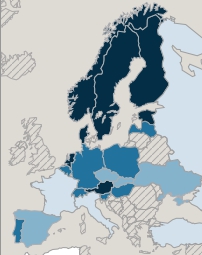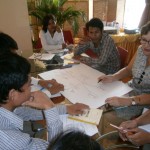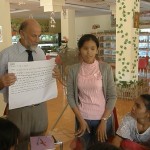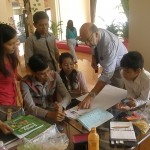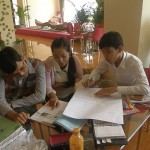The results of research are speaking loud and clear: Thai are having a lot of trouble speaking English.
Thailand is ranking 55 (out of 60) on EF’s English Proficiency Index (EPI)
And Thailand scores lowest in South-East Asia in the JobStreet.com English Language Assessment (JELA)
Some examples
Among many other research results there are my own experiences of the (the lack of) English skills among the Thai after living here for the past 3.5 years.
First there is the, to Thai, most famous English sentence that all Thai kids are taught to use when greeting their English teacher: “Good morning teacher”.
In English speaking countries teachers are never addressed as “teacher”, but as Mr/Mrs/Ms (given name). This of course, is just a literal translation of the the Thai way to address a teacher as “(คุณ)ครู”.
Another, painful example is how Westerners in Thailand are addressed as “you” in situations where the Thai person is calling them because they forgot something.
When forgetting my receipt at 7 eleven or my change at a gas station the cashier will call me back saying “you” which sounds rather aggressive. Of course it’s simply a literal translation of the Thai word คุณ which is a polite way to call somebody you don’t know. In English speaking countries you would use the word Sir or Miss/Ma’am.
These two examples are simple conversation mistakes that are caused by a lack of exposure to the English language. If people would have been given the opportunity to be exposed to English speakers, they wouldn’t have made this type of mistake.
Then there are the pronunciation problems with sounds that are difficult or don’t appear in the Thai language such as the difference between cheap and sheep (the ช sound can be pronounced as both “sh” and “ch”) and the problems with “l” and “r” sounds in words like pleasure and pressure.
Again if people would have been given the opportunity to be exposed to native English speakers, from a young age, their accents would have been much better as human beings learn accents and the set of sound we can make from what we are listening to when we are young.
A lot has already been done
In the past years many things have been tried to improve the quality of English language education in Thailand both by the Thai government and by governments of English-speaking countries such as the British Council.
Skills in general are improving. EF measures scores of 5 points higher in 2012 on their proficiency test compared to the scores in 2007-2009. But the trend is too slow with the opening of ASEAN coming closer and closer.
So why are some countries doing better?
Looking at countries that scored high on EL’s EPI test, it seems obvious to assume these countries have just simply better education, and this is probably true, but next to that there is something else that influences English skills in general and, more important, listening and conversational skills.
It’s television and movies.
In this map marked blue are countries where movies (except for those that have a target audience of children who can’t read) have the original soundtrack with subtitles.
Countries coloured red use dubbing for foreign movies.
To compare; here is a map of Europe showing English proficiency skills.
The darker the colour, the higher the country scores in the EPI test.
There is an obvious correlation going on here.
Although, I have to mention that the EF Test of English (www.eftestofenglish.org) only tests reading and writing skills.
Data in South-East Asia
Let’s have a look on the available data of the South-East Asian countries.
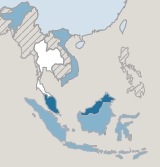 Countries with the highest scores: Singapore, Malaysia, Indonesia and Vietnam
Countries with the highest scores: Singapore, Malaysia, Indonesia and Vietnam
Singapore: Almost all English television and movies are broadcasted and shown with their original soundtrack. Chinese films are subtitled in English
Malaysia: almost all English television is broadcasted with original soundtrack and subtitles
Indonesia: almost all English television is broadcasted with original soundtrack and subtitles
Vietnam: almost all English television is broadcasted with original soundtrack and subtitles. Programs and movies for young children are dubbed.
Country with very low scores: Thailand. Almost all television programmes and movies on television are dubbed. Some movies shown in the theatres in the bigger cities are shown in English with subtitles, but most are dubbed.
Worldwide more and more people start to prefer subtitling over dubbing. Francesca Riggio states in her article that this trend might be the result of the rise of available video content through new media. http://www.1stoptr.com/admin/
So what should Thailand do
The easiest, cheapest, most effective and most elegant key to better English skills for the Thai people is simple. Thailand should show more, if not, all English movies and television programs in English with Thai subtitles.
It will increase the English skills, and especially the listening and conversational skills dramatically for almost 100% of the people as almost everybody (even people in rural areas) have access to television.
It’s a very cheap, quick and easy to execute way to educate almost all layers of society. It’s almost the only way to save Thailand from falling back as soon as the borders of ASEAN are opening up.
Sources
Developing English Speaking Skills of Thai Undergraduate Students by Digital Storytelling through Websites
Manussanun Somdee & Suksan Suppasetseree, Suranaree University of Technology, Thailand
http://www.fllt2013.org/private_folder/Proceeding/166.pdf
Ways to Develop English Proficiency of Business Students: Implementation of Content and Language Integrated Learning
(CLIL) Approach
Dr. Wipanee Pengnate
College of General Education and Languages
Thai-NIchi Institute of Technology
http://www.ijern.com/journal/August-2013/39.pdf
AN INVESTIGATION OF THAI STUDENTS’ ENGLISH LANGUAGE PROBLEMS AND THEIR LEARNING STRATEGIES IN THE INTERNATIONAL PROGRAM AT MAHIDOL UNIVERSITY
http://www.gits.kmutnb.ac.th/ethesis/data/4880181542.pdf
QUANTITATIVE AND QUALITATIVE VIEWS OF THAI EFL LEARNERS’ LEARNING ORAL COMMUNICATION SKILLS
Attapol Khamkhien
Kasetsart University
http://www.savap.org.pk/journals/ARInt./Vol.1(1)/2011(1.1-08).pdf
Omniglot
The online encyclopaedia of writing systems and languages
http://www.omniglot.com/language/pronunciation.htm
Education First
http://www.ef.co.th
DEUS EX DATE
Musings on Data, Science and Behavioral Economics
http://deus-ex-data.com/2013/03/dubbing-movies-and-english-skills/
Wikipedia
Dubbing (filmmaking)
https://en.wikipedia.org/wiki/Dubbing_(filmmaking)
Possible disadvantages of subtitling.
-Some of the spoken language will get lost.
People read slower, then they listen. So some of the things said in movies might get lost and will not be translated in the subtitles.
Counter argument: in dubbing even more get’s lost in translation. Word jokes for example are just hard to translate. When people’s English skills improve, less and less will get lost, because people will simply start listening more to the sound track.
-Dubbers will lose their jobs.
Counter argument. In Thailand only one very small company is doing all dubbing of all films and television. These people will still have to do dubbing for films and television for children who are not yet able to read.
-People working in education will loose business and jobs.
At this moment a lot of people in Thailand are making money teaching either on public or private schools, or in the many tutoring businesses all through the country. When more and more people are getting better in English these people might loose jobs and have less customers.
Counterargument: as we’ve seen from the data in Europe, it’s not just subtitles that help improve the English skills of a country. It’s just a means to better conversational and listening skills and accent might be less thick. But in all these countries that score high on the EPI test, much is done to improve English skills all throughout all the different forms of education. People working in education will not loose their jobs. Their jobs will just get a little easier.
-Dubbing is part of Thai culture.
The small group of people that dub all movies and television in Thailand is somewhat famous in Thailand. At least their voices (and rather funny way of speaking) is famous all over the country. People like to imitate their way of talking as a way of joking. The dubbing team also likes to add Thai word jokes to the movie.
Counter argument: Many Thai people who ones started watching movies with its original soundtrack don’t ever want to go back to watching dubbed movies. They think it’s awkward and sounds stupid. When more and more people will start watching movies with its original soundtrack they will look back to those old days when movies were sill dubbed thinking “why did we even like that?”
-People don’t like to read
Yes, watching television with subtitles might be a little bit more tiring and people just want to relax when they watch television. Entertainment business might get less viewers for those programs.
Counterargument: This is why this can only work if the government enforces all the organisations and companies by law as to what movies and television programs should be subtitled and may not be dubbed. It will benefit both the people of the country as the country as a whole.


